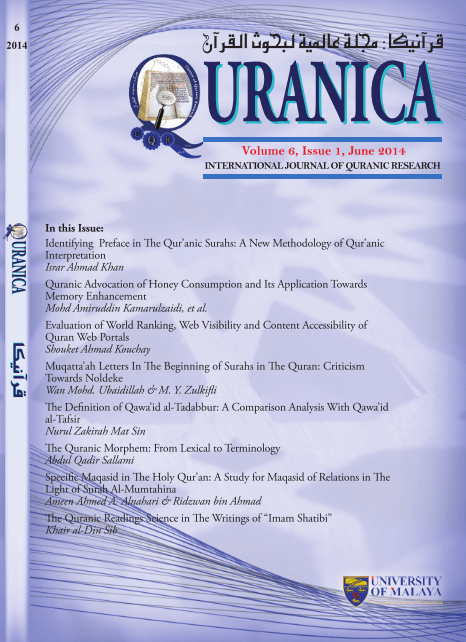Quranic Advocation of Honey Consumption and its Application Towards Memory Enhancement
Main Article Content
Abstract
Over the years honey is not only considered as a natural sweetener, but it is also regarded as a healthy food. Honey meets the requirements as halal (lawful) and tayyiban (good), as mentioned in the Quran. However, very few studies have focused on the effect of honey on memory, either from a scientific perspective or Islamic tradition. This paper looking at the benefits of honey on the memory. The information presented in this paper will look at the benefits of honey on facilitating memory which is made available through a content analysis of scientific references and traditions of Islam. In addition to scientific research reports laboratory studies from the group also become part of the resources for the scientific perspective on honey consumption for this purpose. The Quran, hadith and Islamic scholars writings made up the main source for Islamic perspective on the matter. Honey is highly regarded to the Muslim community as exemplied by the specific mentions in surah al-Nahl (chapter on Bees). Verses 68 and 69 of surah al-Nahl referred to various colors of honey produced by bees with nests in different places. Also mentioned is about the ability of honey as a remedy for various ailments. There are also hadith eluding to related practices using honey by the Prophet as well as recommendations for health problems. Some Islamic scholars, such as al-Zuhri, recommended honey for its good effects on memory. Our laboratory studies proved the benefits of honey on spatial memory (memory with regards to space). A local honey, honey Tualang, was found to have increased spatial memory of rats, especially working memory (short term memory) compared to the reference memory (long term memory). Thus, both the perspectives of Islam and science are in agreement that honey can play a positive role in human health care.
Downloads
Article Details
Disclaimer
QURANICA makes every effort to ensure the accuracy of all its contents. However, opinions, discussions, views and recommendations are expressed in this journal do not necessarily reflect the official policy of QURANICA or views of its editors or publishers. Therefore, QURANICA and its publishers will not be liable for any controversy may be arisen. The journal reserves the right, at its sole discretion, to change its terms and conditions of publications.
Copyright
It is a condition of publication that manuscript submitted to the journal have not been published, accepted for publication, nor simultaneously submitted for publication elsewhere. By submitting a manuscript, the author(s) agrees that copyright for the article is transferred to the publisher, if and when the manuscript is accepted for publication.
